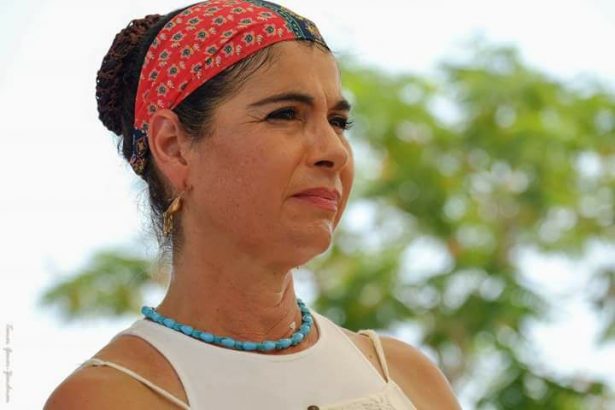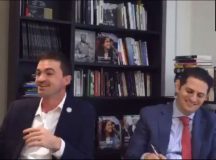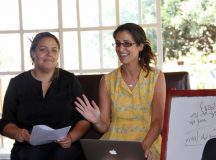Feminism aims to understand the root causes of gender inequality and its intersection with the other dimensions of social and political inequality: minding the gaps and connecting the dots. Hamutal Gouri, former executive director of the Dafna Fund and philanthropic advisor, argues that if transformative feminist activism is to be sustained in Israel it now needs a feminist funding eco-system. She suggests seven steps to create one. Download a PDF version here.
Equality under threat
Supporting feminist causes in Israel has been a major focus of my professional work for more than 15 years as a founder and Executive Director of the Dafna Fund, Israel’s first and only feminist fund that sunset on 31 March 2018. The fund was a laboratory for the development of best practice in raising funds for feminist causes and advocated for the creation of a feminist funding eco-system based on partnership, networking, diversity and intersectionality.
We desperately need a strong and diverse feminist arena in Israel to safeguard our rights and promote equality – both under threat from the growth of religious and nationalistic extremes in Israel (see Scheindlin, Aharoni, Zalkind and Margoliot, and Tirosh). On 18 July, the last day of the summer session, the Knesset passed the Nation-State Law. While public debate and protests focused on the far-reaching implications of the law on the collective rights of the Palestinian minority in Israel, the lack of the commitment to equality should have concerned every Israeli citizen – Jewish or Arab. Equality, including gender equality, was under threat before the Nation-State Law was passed, being omitted from the 1992 Basic Law of Human Dignity and Liberty due to pressure from the Haredi parties. In fact it was the very absence of a constitutional commitment to equality that prepared the ground for today’s questioning of equality by political majorities and powerful interest groups.
In our era of ‘alarm and conquer’ it is tempting to credit dystopian scenarios about the future. This article resists that temptation by celebrating the positive achievements of the feminist movements in Israel and proposing a means to defend and develop that work: the creation of a feminist funding eco-system. After surveying the state of feminist advance in Israel I set out the seven steps that are needed to develop that system.
Injustice and radical hope: Feminism in Israel
When it comes to telling the stories of women in Israel, one is faced with what I call ‘the feminist storytelling conundrum’. Are we telling a story of scarcity or a story of plenty? A story of indignation in the face of injustice, or a story of radical hope? I suggest we have to opt for both.
Injustice
Women comprise 51 per cent of Israel’s population, yet according to the Gender Index published by the WIPS Center at Van Leer Institute, the gender gap in Israel remains steady in most areas of life. Less than 30 per cent of Knesset members are women; only three out 19 government ministers are women and only 2 per cent of mayors and heads of local and regional councils. Women in Israel still earn up to 32 per cent less for the same work as men, are more exposed to abusive employment practices and comprise 54.6 per cent of people living in poverty.
While these numbers are true for other countries around the world, women in Israel face two unique challenges: coping with the lack of separation between religion and State and living in a violent conflict zone. While the former accounts for the exclusion of women from public spaces and the subjugation of their rights and welfare to conservative religious laws and practices, the latter accounts for our exclusion from political discourse and decision-making on issues of peace and security.
In this political climate, the leadership qualities and unique assets of women who could offer a gendered lens on society and the conflict are often undervalued. Yet there is a great deal of evidence that the active participation of women in public and political life serves to build stronger societies and economies, especially when the voices of diverse women are heard in policy formation and decision-making.
Radical hope
Despite the barriers facing women – political, cultural, economic and religious – a 2018 report Past Achievements and Future Directions of Women’s and Feminist Organisations in Israel by Dr Nancy Strichman showed conclusively that ‘women’s and feminist organisations have had notable success over the years in impacting the public discourse and shaping public policies on topics from domestic violence and political representation to gender sensitive budget analysis and women’s economic empowerment’. Strichman continued: ‘Services that were once seen as strictly on the feminist agenda are now generally accepted and have been institutionalised and there is a growing interest in applying a “gender lens” to policymaking.’
Minding the gaps, connecting the dots
It is the job of feminists to ask the probing questions: How many women? Why so few? Who is missing? Which voices are not being heard? Where are the gaps between men and women and what must be done to close them? Feminist work is about unearthing the root causes of gender inequality and its intersection with the other dimensions of social and political inequality: minding the gaps and connecting the dots. This critical approach is of special significance in the Israeli context where ‘formal’ equality often hides a very different daily reality. The work of feminist think tanks, applied research institutes and advocacy groups has created and curated the data regarding gender inequality, dispelled the equality myth and revealed the gaps that require our critical attention.
Security and women
A feminist perspective on peace and security proposes that both are enhanced by a strong focus on inclusion and equality. In Israel, women members of Knesset and feminist activists led the initiative to introduce the principles of UN Security Council Resolution (UNSCR) 1325 regarding the active participation of women in conflict transformation and the prevention of violence against women in conflict zones. Thanks to their efforts, Israel was the first country to include these principles in an amendment to the Woman’s Equal Rights Act (1951) in 2005. Leading feminist organisations and activists also led the initiative to develop a comprehensive National Action Plan (NAP) for the implementation of UNSCR 1325. This NAP was endorsed by the Israeli government in December 2014, yet to date no steps have been taken to implement it by the Ministry for Social Equality. This is but one example of the gaps that exist between policy and practice. The feminist arena is entrusted with the mission to mind these gaps and monitor government actions to close them.
The claim that there is a correlation between gender equality and peace was recently reinforced in a position paper submitted by the Gender Equality Advisory Council for Canada’s G7 Presidency which observed that ‘gender equality is the number one predictor of peace – more so than a state’s wealth or level of democracy’. The paper went on:
Peace and everyday security for women is the core of building just, peaceful and sustainable societies. A more peaceful and secure world means that girls and women have a future free from abuse, exploitation and violence. To strengthen their leadership in building peace, establishing security and supporting sustainable development, G7 members must understand that security goes beyond the contexts of war and armed conflict to include human security and everyday safety. G7 countries must build their own national capacities to improve women’s security domestically.
Religion and women
While the implications of the new Nation-State Law on the political power of state religious institutions remains to be seen, we already know how Orthodox religious laws and norms work to exclude women from participating equally in public, political and cultural life and to undermine their rights on issues of personal status (see Zalkind and Margaliot, Tirosh). On the other hand and perhaps as a direct response to blatant discrimination based on religious coercion, religious feminism in Israel is very much alive and is one of the most exciting developments in the feminist arena in recent years. From the active participation of women in Jewish scholarship and rituals to political representation for ultra-Orthodox women, the work of Orthodox feminists has enriched and challenged the entire arena (see Zalkind and Margaliot, Tirosh).
Intersectionality and women’s coalition-building in Israel
The Strichman report referred to earlier, which was co-sponsored by the National Council of Jewish Women and the Dafna Fund, showed that the women’s and feminist arena in Israel includes over 100 organisations from grassroots, community-based groups to shelters and crisis centres, from national advocacy groups to applied research institutes. This arena is currently more diverse, multi-generational and inclusive than ever before with representation from the different ethnic and religious communities.
This very diversity has challenged feminists in Israel to form new alliances to expand the boundaries of intersectionality. The long march to transform Israeli society now moves through academic research and teaching, data collection and analysis, establishing Israel’s first ever gender knowledge centre, feminist storytelling on social media, community organising, national advocacy, and fostering the economic citizenship of women to enhance their political representation. As I write this, a partnership of two inter-organisational coalitions are working to safeguard the rights of women in abusive and exploitative employment. Another coalition of more than 20 organisations has succeeded in getting a record number of women to run for office in local elections in October 2018. Feminist and women’s organisations and movements are coming together in new ways to advocate for political representation for Haredi women, for a mutually binding peace agreement, and for justice to victims of femicide. However, if this diverse work is to be sustained, never mind expanded, it now needs a feminist funding eco-system.
Seven steps to create a Feminist funding eco-system in Israel
First, encourage joint strategising and action by diverse stakeholders
When the Jewish Women’s Funding Network, a coalition of more than 20 US Jewish Women’s Funds, decided to launch a second collaborative grant-making cycle in Israel, it opted for a non-competitive and highly participatory process, based on dialogue between the member funds and women’s rights organisations in Israel, through face to face and video conference calls. Finally, the topic that was chosen was promoting the rights of women in abusive employment and the grant was awarded to a partnership between two inter-organisational coalitions: The Coalition for Direct Employment and Shutafot (Partners). The staff and members of the two coalitions consulted with diverse stakeholders on both the national and municipal levels: from women in abusive employment, to mayoral candidates and elected local officials, members of Knesset and labor rights advocates.
There is much to learn from this kind of experience. The process was not only highly participatory, but also very inclusive, bringing to the table the voices of diverse stakeholders, each contributing to the overall success of the project.
Second, ensure greater engagement of state agencies
State agencies can and should play a critical role in promoting gender equality through legislation, enforcement, budget allocations, financial incentives and gender sensitive data collection. Analysis of the Gender Index published annually by the Center for the Advancement of Women in the Public Sphere (WIPS) shows that policy reform, development of gender sensitive services and more rigorous enforcement of labour laws can contribute to closing prevailing gender gaps.
More specifically, state agencies can leverage and support the sustainability and expansion of best practice models developed by women’s rights groups with the support of philanthropic funds. I recently visited the Sidreh Association in the Bedouin town Lakiya and saw how the organisation, with the support of international foundations, has developed sustainable artisan, agriculture and tourism, and micro-business initiatives for and by women. The organisation provided intensive training and mentoring to the women and helped them gain initial access to markets through regional fairs and festivals, marketing materials and more. Micro-entrepreneurship is recognised around the world as an effective way of getting women out of poverty, in developing local economies and in improving the lives of women and their families. State authorities, including the tax authorities and the National Insurance Institute can and should endorse policies that help women-owned micro and small businesses thrive by providing tax exemptions and breaks; support culturally sensitive training programmes for women and continuing to pay income supplement stipends until the businesses are up, running and profitable.
Third, engage in systematic learning from those doing the work on the ground
When we established the Dafna Fund in 2003 we convened women activists, scholars and leaders from various sectors and communities. ‘The Council of Wise Women’ was designed to draw on individual and collective wisdom, brainstorm new ideas and gain diverse and critical perspectives on new directions for the fund. The input from participants has informed our funding priorities, our grant-making tools and the capacity building services we offered to our grantee partners and other feminist groups.
For example, when we decided that we needed to know more about young adult feminist activists, we conducted a field research that included both one-on-one interviews and focus groups with young women from all walks of society. The insights we gained informed the design of our call for proposals for multi-generational feminist leadership programmes. These practices reflect not only an appreciation for the vast knowledge and experience of women in the field; they also serve to develop better funding programmes and processes and develop a body of knowledge and data that can be shared with other funders.
Fourth, give all funding a critical gender lens
A major challenge to promoting giving with a gender lens is that women’s rights and gender equality are often perceived as an isolated ‘issue,’ in competition with other ‘issues’ such as the environment, education, welfare, poverty eradication, health, peace and security. However, to go back to my opening remarks; women comprise 51 per cent of the world’s population, and therefore every issue has a gender component. All funders should therefore apply a gender lens and consider if the programmes they are supporting address the unique needs of women and girls and enhance equal opportunities.
Several years ago, I worked for a family foundation that had an extensive children and youth at risk portfolio; it supported many good programmes such as foster care, after school clubs and clinical education programmes on children’s rights and street law. The more I worked with programmes serving children and youth at risk the more I realised the need to apply a gender lens to the foundation’s giving in this area. Together we began to explore the gender aspects of risk and identify the unique risk factors for girls, their needs and concerns. A research report commissioned by the foundation revealed that in an overwhelming majority of the cases, sexual violence – including incest – was a major risk factor. The trauma was often exacerbated by the lack of appropriate responses: prevention, therapy and rehabilitation services and holistic frameworks who applied a critical feminist lens and provided a tight safety net.
When the foundation applies a gender lens to its giving for girls and female young adults at risk it encourages grantees to do the same and develop gender sensitive programmes that meet the unique needs of girls at risk. By providing funding to organisations that develop best practice models for working with girls at risk government agencies are encouraged to increase allocations for gender sensitive services to girls and young adult women.
Fifth, go political
Gender inequality is a political issue because it is a result of power relations and social structures through which men get the upper hand. Political, social and cultural norms and practices are constantly at work to exclude women from taking an active and equal part in shaping public policy and the society we want to live in. However, even funders who are committed to improving the lives of women and girls sometimes shy away from supporting advocacy work, designed to change government priorities or reform discriminatory legislation.
For example, foundations who support ‘welfare to work’ programmes for single mothers sometimes will not support the efforts of feminist groups to change the laws and regulations that currently make it impossible for single mothers to have a decent paying job and keep their income supplement or child support payments paid through the National Insurance Institute. Whether these funders are unaware of this injustice that sentences single mothers to a life in poverty or whether they are choosing not to fund advocacy efforts for other reasons, one should know that the effectiveness of ‘welfare to work’ programmes will continue to be curtailed by government policies.
More broadly, funders should be willing to engage in ‘controversial’ issues or those labelled as ‘political,’ namely, those associated with the Israeli-Palestinian conflict. As I wrote earlier, the voices of women must be heard on those issues if we are striving to achieve a breakthrough in the status-quo.
Sixth, taking risks and making bold gifts
To encourage the feminist arena to leverage its collective power and enhance its impact we must be willing to take risks and allow for the development of innovative best practice models. Some of the most high-risk, ambitious and ground-breaking projects may just turn out to be the flagship projects we are most proud of.
The first call for proposals of the Dafna Fund released in 2004 invited organisations to think big and be creative, building the next floor of feminist work. We encouraged partnerships with mainstream organisations to promote feminist mainstreaming. Hence, many of the grants the Dafna Fund made started with highly ambitious ideas. This was the case of the ‘Women Legal Leaders’ programme initiated by Itach-Ma’aki, Women Lawyers for Social Justice, in partnership with Haifa University Faculty of Law that changed the way we think today of grassroots feminist leadership development, and the Achoti (‘Sister’ in Hebrew) ‘Feminist Grassroots Economy’ programme that evolved into a national fair-trade programme that celebrates the art and craft of women from disenfranchised communities. We funded both for eight years and they each evolved way beyond our initial high expectations.
Being willing to take risks should be part of a funder’s DNA and if we are out to change the world, we should actively seek out the causes, people and groups who need us the most. In 2010, the Dafna Fund started supporting Arab Women in the Center (AWC), an Arab feminist organisation based in Lod, a mixed Jewish-Arab City near Tel Aviv. The organisation was then in its very early stages, yet it had a big vision; to empower the women in Lod, Ramla and Yafa and to combat gender based violence in general and femicide in particular. The violent murders of Arab women were then referred to by police officials, the media and the public as ‘honour killings’. Dafna supported AWC for 8 years, until we sunset. The small group of women convened by Samah Salaime, the founder, evolved over the years to a network of powerful, courageous women who are slowly but surely transforming their communities.
Thanks to the work of AWC, in partnership with Women Against Violence and other Arab feminist organisations and Arab members of Knesset, the term ‘honour killing’ is gradually disappearing from police statements and media coverage, as public awareness to femicide slowly increases. MK Aida Touma Sliman, chair of the Knesset committee on gender equality and the status of women, held several special sessions on the issue of femicide and thus helped feminist groups and activists deliver a clear message that the murder of women from all walks of society was not a private matter but a vicious crime that should be investigated and the perpetrators brought to trial.
Seventh, going beyond short-term philanthropy
Creating a feminist funding eco-system also means going beyond philanthropic investments. We must help feminist groups develop other sources of income, including community-based support and membership fees, income generating projects and more meaningful allocations from state and local government agencies. The development of these capacities and the sustainability of joint fundraising and action require stronger organisational infrastructures. Funders should be willing to provide general support rather than project-based funding, and offer capacity building as well as opportunities for diverse stakeholders to convene and conduct vital conversations.
Conclusion
In my many years as a foundation executive and advisor I have grown used to being the designated ‘gender nudge’ in the room; the one to write the blog posts with the gender edge and to constantly ask my colleagues, ‘What about the women?’ As a society we cannot continue to ignore the wisdom, the experiences, the stories and dreams of half the world. In Israel, women’s voices are so often excluded from public discourse on critical issues such as economy and sustainability, religion, peace and security. If we are serious about creating a model society, one based on values of equality, justice and inclusion, we must ensure the full participation of women.





































